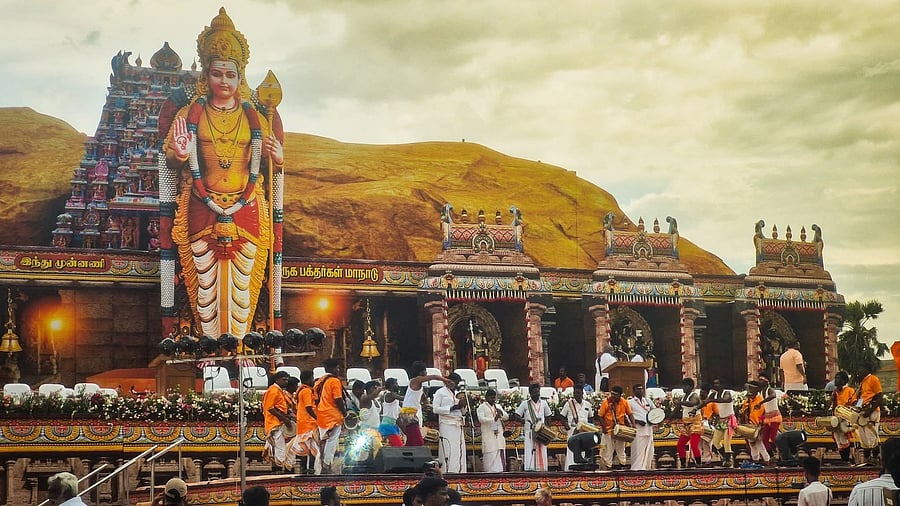
A scene from the Muruga Bakthargalin Manadu.
Credit: X/@vinod_bansal
‘Hindus in Tamil Nadu should unite and vote as a cohesive bloc in the 2026 assembly elections to demonstrate their electoral strength,’ read one of the resolutions passed at the Muruga Bakthargalin Manadu (Murugan Devotees’ Conference) held on June 22 in Madurai.
A blatantly political message from what was billed as a “purely spiritual” event by its organiser, Hindu Munnani, came as no surprise. The Bharatiya Janata Party (BJP) was actively involved in the event, inviting right-wing leaders from across the country as well as dignitaries like Andhra Pradesh Deputy Chief Minister Pawan Kalyan.
Speakers at the event warned of threats to Hindus in Tamil Nadu, including “forced conversions” to Christianity and the presence of the Sikandar Dargah near the famed Lord Murugan Temple in Thiruparankundram in Madurai. They issued a clarion call to “eradicate Dravidianism” — all in the presence of visibly uncomfortable AIADMK leaders.
Former Tamil Nadu BJP chief K Annamalai stressed the need for children in Tamil Nadu to be allowed to wear religious symbols in schools. Meanwhile, videos screened at the event attacked “fake Dravidianism” and “fake rationalism”, taking aim at Dravidian leaders such as E V R Periyar, C N Annadurai, and M Karunanidhi.
The BJP, which dubs the ruling DMK as “anti-Hindu”, sees political opportunity in such “spiritual” gatherings. With the 2026 Assembly elections just a year away, the party hopes the messaging will resonate. The AIADMK’s participation has also raised questions about whether it now sees minority voters as beyond reach.
Murugan, widely regarded as the Tamil god, is believed to reside in six abodes across the state. He is one of Tamil Nadu’s most revered deities, especially among backward communities, transcending caste lines.
This appeal was one reason even the ‘rationalist’ DMK government invoked Murugan last year by organising a conference in Palani — an effort aligned with its linguistic politics and aimed at countering its “anti-Hindu” image. Lord Murugan has been on the BJP’s radar for the past five years, with the saffron party making a concerted attempt to make him its poster boy in
the state, where it is seeking to establish a firm footing.
The party believes that invoking Murugan could yield votes in Tamil Nadu—much like Ram did in North India—even though the state has historically not voted along religious lines. Given Murugan’s association with the downtrodden, the BJP sees in him a vehicle to reach backward communities, shed its Brahminical image, and project an inclusive image.
This is the BJP’s third major political outreach around Murugan. Earlier efforts failed to gain traction. In November 2020, at the height of the Covid-19 pandemic, the BJP launched a ‘Vetrivel Yatra’ to defend the god’s honour after a YouTube channel mocked Kandha Sashti Kavasam, a devotional song. However, it neither captured the public imagination nor translated
into votes—the party’s 2021 tally of 4 out of 20 seats was largely due to its alliance with the AIADMK.
The BJP and other Hindu organisations had to almost abandon their series of protests against the demand by a few Muslim organisations to rename a hillock in Thiruparankundram as Sikandar Malai after judicial intervention. Residents of the area, known for religious harmony, opposed attempts by both Hindu and Muslim groups to politicise their village. Locals insisted that people of both faiths had long coexisted peacefully, offering prayers at their respective places of worship.
Despite criticism that the BJP is “appropriating” Tamil gods like Murugan for political gain, the party went so far as to liken Thiruparankundram to Ayodhya. “This will be the next Ayodhya,” BJP leader H Raja declared. But the protests made little headway, even though the party continues to raise the issue and Union Home Minister Amit Shah referred to it during a visit to Madurai earlier this month.
Senior journalist Maalan Narayanan told DH that the BJP believes a large-scale conference celebrating Murugan will consolidate Hindu votes behind the AIADMK-BJP alliance. He also noted the symbolic emphasis placed on non-Brahmin leaders at the Madurai event.
“The BJP believes it can’t win elections in Tamil Nadu because Hindus don’t support the party overwhelmingly. But it must understand that people in Tamil Nadu may vote on the basis of caste, but not on religion, because they don’t feel any threat from minority communities. Issues like Thiruparankundram have no emotional value for the local people,” he said.
Prof Ramu Manivannan, who taught political science at the University of Madras, was more direct. He argued that the BJP’s attempt to politicise Murugan, as it did with Ram in North India, will not succeed in Tamil Nadu. “In fact, it was Ram who needed the RSS and BJP in the North. Murugan doesn’t need anyone. There is no dispute here unless the BJP creates one,” Manivannan added.
The BJP may continue to expand its religious campaign, but the real political battle is unlikely to be about the idolisation of Murugan. “But the saffron party can keep on fighting in an empty terrain to create an image war,” Manivannan said.
Narayanan agreed, adding that he does not anticipate any major electoral gains from the conference. He reminded the BJP that the Tamil electoral narrative is often framed as Tamil vs Sanskrit or South vs North — an extension of the Aryan vs Dravidian theory—not merely Hindu vs non-Hindu.
“The BJP needs to draft strategies that address real issues on the ground. It must learn from the Dravidian parties and appeal to Tamil intellectuals,” he said, pointing to the absence of a counter-narrative from the BJP to the DMK on issues like language. “Counter-narratives invoking Subramania Bharathi as an icon may draw secular and nationalist voters to BJP,” Narayanan added.